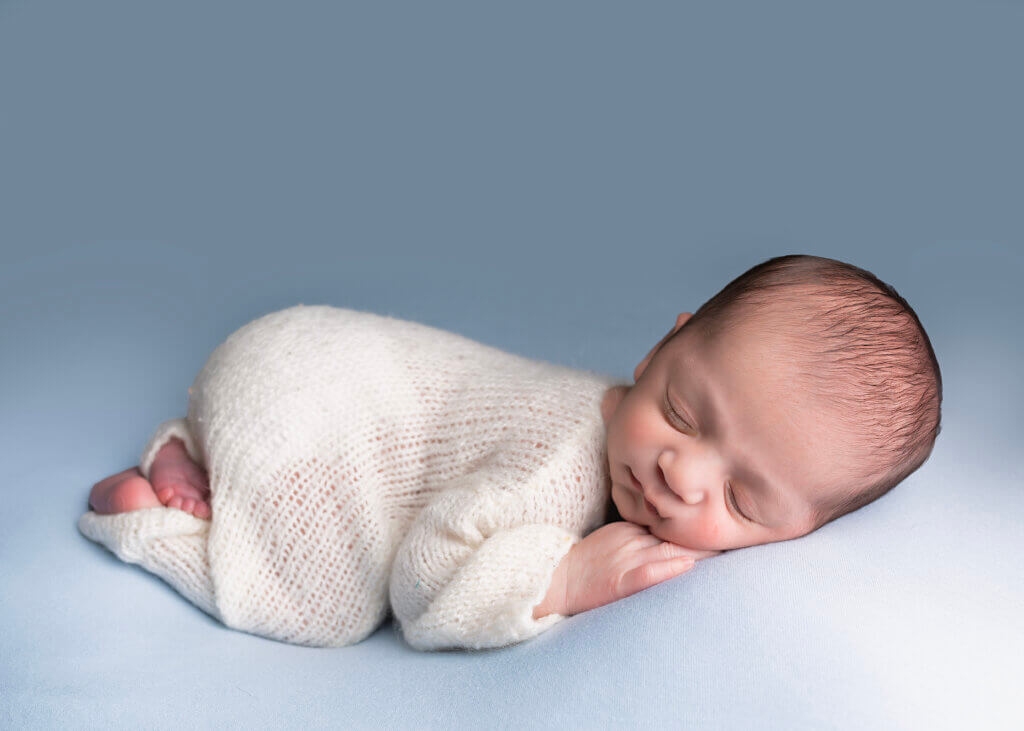Bringing home and caring for your newborn is an exciting and overwhelming time for any new parent. It is a time filled with sleepless nights, endless feeds and nappy changes. As a new parent, it is easy to feel overwhelmed when you bring your new baby home for the first time. Unfortunately they don’t come with an instruction book and despite what people say, their cry never sounded different to me, whether it be that they had a full nappy or that they were hungry.

I have so much experience working with newborns and speak to parents almost daily in my portrait studio, so Ive picked up a lot of tips over the years. In this blog, I’ll share some essential tips that I’ve picked up on what to expect and how to care for your newborn during this special time.
Feeding
Newborns need to eat every 2-3 hours, which means you’ll be feeding your little bundle of joy around the clock. Whether your breastfeeding or bottle feeding with formula, it is important to make sure your baby is getting enough nutrients to grow and thrive. In the first few weeks, your little ones stomach is very small, this means that they will need frequent feeds to stay full and satisfied. When your discharged form hospital, you’ll still have a community midwife visiting until your baby regains the weight they lose in the first couple of days after delivery. Your community midwife should be a fantastic source of information on feeding and will be able to signpost you to additional support services if you require them, especially for breastfeeding issues.
If feeding with formula don’t forget to have an adequate supply of bottles and teats, as well as your preferred method of sterilisation.

Sleeping
Newborns typically sleep for most of the day, usually around 16-17 hours in a 24 hour period. this is one of the reasons why newborn sessions are best scheduled for the first two weeks after your baby arrives. After two weeks, newborns generally become more alert and start to stay awake a little longer. Although newborns do sleep for long periods , it’s definitely not in long stretches, so it can be difficult to believe they sleep for long periods! Newborns wake up frequently for feeds, nappy changes and cuddles. It is important to create a safe environment for your baby, such as placing them on their back in their crib or Moses basket with a firm mattress and a fitted sheet. Avoid having toys or loose blankets in their sleeping space.
Your health visitor arranges to visit your home before your baby arrives so that you can meet them. The health visitor will usually want to see where the baby will sleep and will offer advice on the latest safe sleeping guidelines.
Nappies
Expect to change around 10-12 nappies a day in the first few weeks! You’ll want to decide if you’re going to use disposable or reusable nappies. Cloth nappies have really advanced over the last ten years and are a brilliant eco-friendly choice. You can find out more about using cloth nappies here. Either way, you’ll need to make sure you have a stock of nappies, wipes (again, there are tons of eco-friendly options, including washable/reusable wipes), and nappy or barrier cream on hand. It is important to keep your baby as dry as possible to avoid nappy rash, which can be very uncomfortable for your baby.
Bathing
Bathing your newborn can be nerve-wracking, but it is important to keep them clean and comfortable. In the first few days, you won’t need to bath your baby as it is important to preserve their natural oils for those first few days after birth. However you may want to give them a top to tail wash using flannels or cotton wool. Your baby’s umbilical cord stump will need to be kept clean until it falls off (typically around 1-2 weeks old). Many babies who come to me for newborn sessions still have their cord stump attached – it just shows how new they are! The NCT have some really useful tips for bathing your baby, including a really helpful video here.
Bonding
Bonding with your baby is crucial in the first few weeks. Spend time cuddling, talking and singing to your baby. Skin-to-skin contact is also important for bonding and can help regulate baby’s temperature, heart rate and breathing. These bonding moments are beautiful to capture as images. Take selfie and ask your partner or family members to capture these precious moments for you.
Ask for help
Finally don’t be afraid to ask for help. Caring for your newborn can be exhausting and it is important to take care of yourself as well. Everything seems a million times harder or worse at 3 in the morning when your sleep deprived. Ask friends and family for help with meals or watching your baby while you take a s shower or a nap.
Caring for your newborn can be challenging in the first few weeks, but it is also a special and rewarding time. It is a time that is so fleeting, so take lots and lots of photographs and videos. And remember to get in those photographs yourself. You’ll some find your rhythm and enjoy this precious time with your newborn.
I hope you enjoyed this blog on caring for your newborn. If you would like to book a. newborn session to capture this precious time for you and your family get in touch.
All images in this article were taken by Sage & Eve Photography
www.sagendevephotography.co.uk









